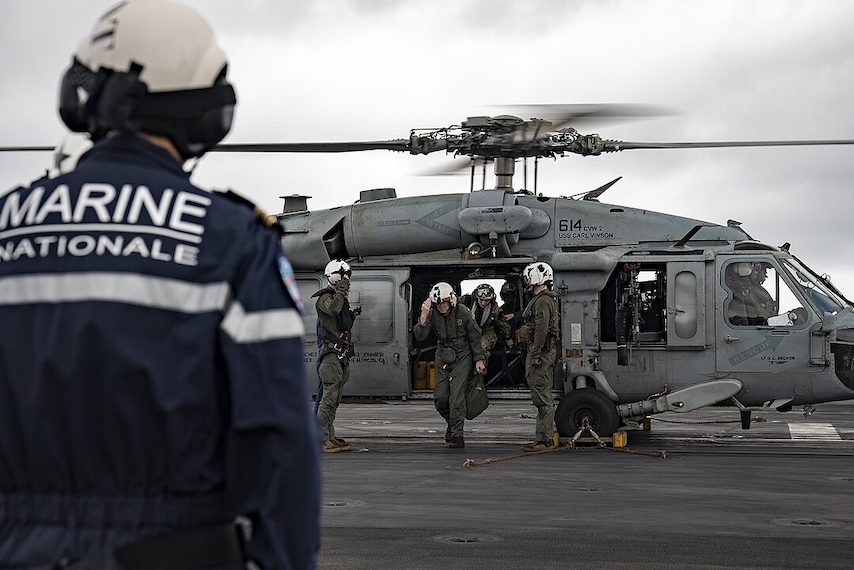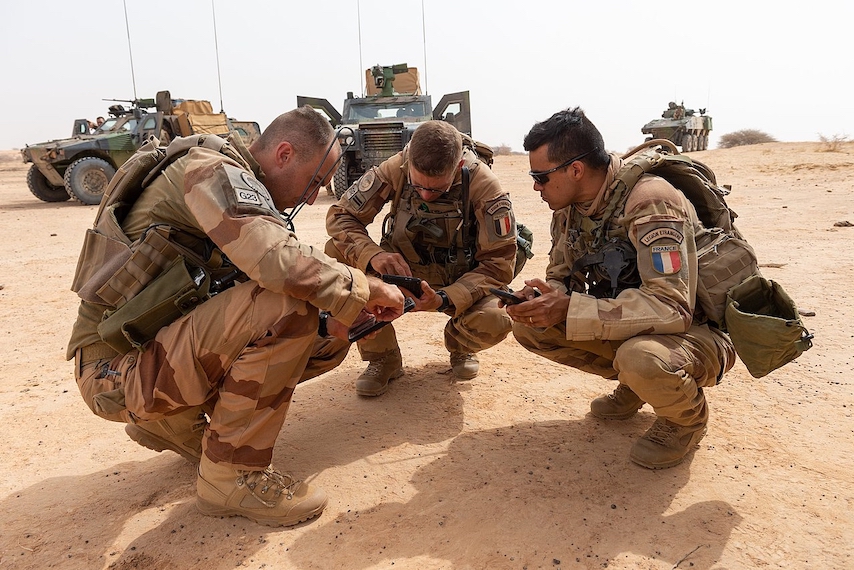The Platform
Latest Articles
by Mohammad Ibrahim Fheili
by Abidemi Alade
by Sheiknor Qassim
by Theo Casablanca
by Vince Hooper
by Samita Sajeevan
by James Carlini
by Sheiknor Qassim
by Samudrala VK
by Mohammad Ibrahim Fheili
by Abidemi Alade
by Sheiknor Qassim
by Theo Casablanca
by Vince Hooper
by Samita Sajeevan
by James Carlini
by Sheiknor Qassim
by Samudrala VK
Bonne Chance! France Wants to Remain a Military Power
While it has nukes and a single aircraft carrier, France’s ambitions to remain a formidable military power might run into some roadblocks.
“France must once again become a great power. It’s a necessity.” These words from French President Emmanuel Macron underscore his vision for France’s role in a shifting global order. Gone is the 1970s notion of France as a mere “great middle power.” Today, amid the persistence of terrorism, rising geopolitical tensions, and a European Union struggling to forge a cohesive defense force, Macron argues that France must bolster its military might to safeguard its sovereignty, strategic independence, and values.
With one of the world’s most advanced armed forces, a resilient alliance network, and a nuclear deterrent established in 1960, France remains a formidable military power. Yet, as war rages on Europe’s borders, instability mounts in the Middle East, and the future of NATO hangs in uncertainty—particularly given the potential withdrawal of the United States, its single biggest contributor—France must reassert itself to retain its strategic influence. The rapid evolution of military technology, from drone warfare in Ukraine to artificial intelligence reshaping combat strategies, adds another layer of complexity. In this high-stakes environment, Macron envisions France as “the leading European army, the second in the free world after the U.S.”
But can France sustain its position in this exclusive club of military superpowers? The coming decades will be defined by a fierce competition for technological supremacy in defense. The race is no longer just about troop numbers or firepower but about mastery of artificial intelligence, autonomous weapons, and cyber warfare. France must now navigate a path fraught with financial constraints, political hurdles, and technological acceleration to maintain its status as a global military power.

France ranks 11th in global military power, with defense spending of $64 billion constituting about 2% of its GDP. Despite criticisms that its forces are “sample-sized,” the French military boasts cutting-edge capabilities. France’s nuclear arsenal, comprising approximately 290 warheads delivered via submarine-launched ballistic missiles and air-launched cruise missiles, places it alongside the U.S., Russia, and China in deterrence power. The M51 missile, the latest in its nuclear strategy, represents a key element of France’s ongoing military modernization.
On the conventional front, France’s military technology is among the world’s most advanced. The Scorpion program, launched in 2019, is transforming battlefield operations with next-generation digital combat systems. With the aircraft carrier Charles de Gaulle, the French navy remains a rare force capable of global power projection. The air and space forces, equipped with Rafale and Mirage 2000 fighter jets (soon to be replaced by a new sixth-generation aircraft), further solidify France’s strategic reach. Space capabilities, bolstered by the Ariane launchers in French Guiana, also enhance France’s defense posture.
However, France’s most pressing challenge lies in emerging technologies. AI-driven systems, advanced robotics, and cyber warfare are reshaping the very nature of military power. While the U.S., China, and Russia aggressively invest in these domains, France has only recently made artificial intelligence a defense priority. The establishment of the Ministerial Agency for Defence AI (AMIAD) in 2024, with an initial budget of $327 million, signals recognition of this critical need. Yet, compared to the Pentagon’s AI-led Project Maven or China’s ambition to lead the world in AI by 2030, France lags behind. Worse, middle powers like Algeria are already investing in AI for military applications, potentially eroding France’s strategic edge.
France’s military power is underpinned by a robust defense industry. Companies such as Airbus, Dassault, MBDA, Nexter, and Thales ensure that France remains the world’s third-largest arms exporter. These firms, spanning aviation, AI, robotics, and artillery, provide France with an enviable degree of strategic autonomy. Unlike many European allies reliant on foreign suppliers, France maintains control over much of its defense production.
Despite this industrial strength, financial constraints loom large. The Military Planning Law 2024-2030 allocates $450 billion over seven years to defense. However, only $11 billion is earmarked for innovation—a sum deemed insufficient given the demands of AI, quantum computing, and directed-energy weapons. Compared to U.S. and Chinese investments, France risks underfunding the innovations that will define military supremacy in the coming decades.
Further complicating matters is France’s dependence on foreign technology, particularly semiconductors—the backbone of modern military systems. With Taiwan controlling 60% of global semiconductor production, France faces vulnerabilities in supply chains critical for AI, drone warfare, and missile guidance systems. As global tensions heighten, securing access to these technologies becomes as strategic as military alliances.

France’s military commitments extend far beyond its borders. As a permanent member of the UN Security Council, France plays a leading role in peacekeeping missions in Lebanon, the Central African Republic, and Mali. Within the EU, it has long championed a European defense strategy, though efforts to establish a unified European army have floundered. Since Brexit, France has emerged as Europe’s principal military power but lacks the political leverage to forge a cohesive EU defense policy.
France balances cooperation with the U.S. and its vision for European strategic autonomy in NATO. However, should the U.S. withdraw, NATO’s stability could be shattered, exposing France and Europe to heightened security risks. Macron has called NATO “brain dead” in the past, but without U.S. military backing, France would struggle to fill the gap alone.
At the same time, France must contend with rising military powers across the Middle East and Africa. Nations like Algeria, Saudi Arabia, and Egypt are expanding their defense capabilities, altering regional power dynamics. Meanwhile, Russia’s aggression in Ukraine and China’s militarization of Taiwan’s periphery present direct challenges to France’s global strategy.
France must take decisive steps to maintain its military stature. France should spearhead a genuine EU defense framework, working closely with countries like Poland, which has ramped up military spending in response to Russian aggression. Establishing pooled resources and joint technological projects will be crucial for European military autonomy.
AI-driven warfare will dominate future conflicts. France must accelerate investment in military AI, including battlefield reconnaissance, automated logistics, and lethal autonomous weapon systems (LAWS). Expanding cyber defense capabilities will be critical to countering espionage and cyberattacks, which could cripple military and infrastructure systems.
Collaboration with European firms like Saab and KNDS and U.S. AI leaders like ShieldAI will be vital to staying competitive. Strengthening ties with Taiwan, South Korea, and the U.S. for semiconductor access will be a strategic necessity.
France must embrace robotic warfare to reduce battlefield casualties and optimize cost efficiency. Programs like Scorpion and Titan should integrate AI-driven reconnaissance and combat systems.
France stands at a crossroads. Its ambition to be Europe’s leading military force is within reach, but only if it adapts to the rapid technological evolution defining modern warfare. AI, robotics, and cyber capabilities will dictate the next global military hierarchy, and France cannot afford to fall behind.
As the world enters an era where war is increasingly fought with algorithms, autonomous drones, and cyber offensives, France must commit to innovation while balancing the ethical dilemmas posed by these technologies. Remaining a military power in the 21st century will not simply require tanks and fighter jets—it will demand leadership in AI, digital warfare, and strategic alliances. The decisions France makes today will determine whether it remains a great military power or cedes its place in the new order of war.
Corentin Barré is in his 3rd year of a Bachelor's degree in Political Science and International Relations at Warsaw University. He is interested in international issues relating to contemporary security, diplomacy and armed conflict. His research and areas of study focus mainly on Europe and the United States.